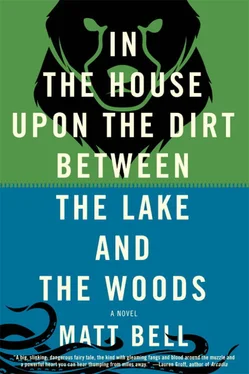And in this roar, how my wife first found the bear, long asleep, long pregnant as my wife would one day wish to be pregnant. And in this roar, how my wife had placed her hands upon the bear’s swelled season, her stomach still full-furred in those days, and how my wife had held her hands there until she felt the four-footed kick of the cub.
And in this roar, what happened next, the first split of the bear’s own fur, the first growth of bone or shell to cut its way out, wounds made by my wife’s songs, by their desperate and varied attempts to slow the bear, to speed my wife’s escape after she was caught.
And in this roar, the too-early labor of the bear caused by the same, her cub loosened by the bear’s chase of my wife, by her premature return to the woods, to the tree line where I saw her for the first time.
And in this roar, how the bear tried to return to sleep, to slow the cub’s coming, how in her dreams she believed it a thing done, and yet how as she slept the cub did come.
But first how her strange pregnancy seemed to take years , the bear thought or else dreamed, and still the cub was born too soon after the bear’s angry pain, her destruction of our cargo, her retreat into the depths: her cub then a tiny thing, unable to care for himself, but with a dozing mother too hurt to nurse him right, unable to do anything but sometimes sing some simplistic bear-song, a lullaby meant to slow his growth until the bear could be made right, well healed enough to mother him.
How one day when the bear awoke, her slowed cub was gone, and she did not know where he had gone.
And then this last roar, all the truth left to tell: The bear told me that the father of her child was a bear. She told me that the father of her child was not a bear. She told me that the father of her child was here. She told me the father was not here. She told me that the father of her child was nowhere, and also everywhere, as long as everywhere did not extend to the other side of the lake, the other side of the mountains, that rich earth where things were less simple than they were upon the dirt or within the woods or beneath the lake, and so perhaps there was even more that was possible, more than she remembered.
Perhaps, she roared or, rather, not the word but what words I heard in the sound: Perhaps, but even if that was so then still that was not the way here. And in her voice I heard something so like the voice of my wife, some similar tone to that with which she had told me how we would make the dirt our own, how with new rules we would shape from it the world we wanted.
The bear woke me from my memories with more of her voice, and then she told me that upon the dirt between the lake and the woods, always there were two that appeared, and always the two made a single child.
She told me that now there were four, and too many children besides, because ours was both boy and cub, and perhaps none of the four was set upon the right place, nothing shaped as it should be shaped, and when she was done telling me this she told me what she thought should be done to put our world to right—what should be done to my wife and to one other—so there might be a right number of each, of male and female, mother and father, parent and child.
With loud and quiet roars, with a variety of vocalizations I had never heard before, a bear-song simpler than our own speech but supple enough for possible truth, she told me that if I would return her cub to her—and if I would also punish my wife for taking him—then she would take care of the other, my own complement I had not yet met, and afterward the numbers would be better balanced, as always they had been intended.
I nodded as I listened, but I knew she was not quite right, for in all her calculations she did not count the fingerling. He was my secret alone, and so long as he was within me, then there was no proper math.
THE BEAR’S CARAPACE SHIVERED, HEAVED. She lowered her shoulders to the ground, then motioned with the wedge of her head that I might climb up. I searched for purchase among her bones, dug out handfuls of fur and slipped flesh before finding promontories on which to make my nervous clenching, and after I was right-straddled atop her the bear leaped out of her chamber, climbing sure and swift into and up and through the deep tunnels to the surface. Outside her cave, the bear charged through the woods, whipped through branch and thorny bramble until my face and arms were scratched and scraped, each new blemish drawing what blood remained, and before I could voice any complaint we were arriving, already back at the burying ground.
There the bear slowed, circled once, then stopped and stood upon her hind legs, raising her half-furred face above her shoulders so that as she ascended I fell from her back, landed hard. Freed of her burden, she remained standing to howl at the moons, which at first continued their slow arc unfazed by what sound she hurled at their shapes, no matter how she carried on.
Frustrated, the bear lowered herself, then stood to howl once more, and this time I thought I saw my wife’s moon shake in its circuit.
And so again I said that I would do as I had been asked, this time in my own voice: I would enter the house, I would seek out my wife, and in the deepness I would convince her to give up the foundling.
OR ELSE TAKE HIM FROM HER, said the fingerling, from out of my mouth, and then again the bear shook its hackles, again it roared until all the woods and my wife’s moon shook around us, and still there came more sound from the bear, more spit-flecked thunder and command, and then from the surrounding graves came that exodus I knew nightly happened but which I had never before seen. As I watched, broken-boned deer and elk and moose pushed forth from the forest floor, and then cougars and muskrat, wolves and coyotes, beavers and squirrels and rabbits and skunks and chipmunks and wild goats and boars, partridge and pheasant and peacock and grouse and all other manners of beast and bird, each called by the bear from whatever shallow place I had buried its shell. I recoiled as they stumble-rushed into the thickets or failed to take flight, for all the wrongs I had done now came past me on all sides, their injuries grotesque, and yet how I would commit the same wrongs again, how I knew I would: The wants that had prompted me to break their bones and beaks, to rip their fur and feathers, to taste their oddest parts, none were resolved, and when I was remade I too might be less than I was.
The bear knocked me flat with the heavy paddle of her paw, then held me against the soft-flipped dirt: With tooth and claw she undressed me until I was naked and then again until I was stripped of my nakedness. My wounds oozed, fed the roots below, and when I was empty of blood I took one more breath and then I was empty of that too, and as I suffered, the bear breathed herself into my unskinned body, filling me with her coughs and her wheezes and also her musk, her wild smell which ever after leaked from my pores.
Within the bear’s heated speech, I heard her melody, like that of my wife’s but simpler, without proper words, and with that sound the bear scabbed each wound, filled each divot with song-made flesh, as my wife might have done to make her foundling. This new body, it was meant to last the long journey ahead, that departing beneath the dirt to which we had agreed, and with its completion the fingerling grew excited from his many perches—and in that moment I became something else, other than what I had been—some not-quite-husband, a dream of the bear, as the bear was perhaps the dream of the woods, of the cave beneath, set in motion toward what she wanted most, toward what I or the fingerling had agreed, a pact without which she would not have rebuilt this body upon my bones: I would enter the deep house, and there I would find my wife and convince her to give up the foundling and also to again skin him as a bear using his right and previous fur, which I would carry with me into the earth. In return we would not be punished for our crimes, neither me nor my wife, and so we might be free to leave the dirt, escape back around the lake, to our fathers’ country over the mountains, or else to some other distant land, like this one but also better emptied.
Читать дальше












